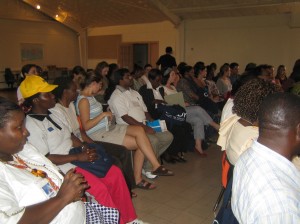Classes Begin
We’ve officially had three full days of courses with the Coady Diploma Participants and two weeks more to come. I have to admit that I was ready to write-off the whole course after the first day of classes – some of the participants didn’t vibe with the participatory teaching style (i.e. a lot of small group discussions and energizers) – there was a lot of interrupting, and there also seemed to be a language barrier. That all started to change, though, as we all became more comfortable with each other and began discussing issues more relevant to the participants’ backgrounds and interests in community development.

It’s like how Berin was telling us about the forest communities in Nepal. NGOs thought they were “helping” these communities, by transferring them to the city, until they found the people back in the forest some time later. Fred made the argument that sometimes people don’t know what they need, at which time the donor may be justified in intervening. He had worked in Somalia during a large famine and the people felt that they needed food, of course. But just giving away food wasn’t sustainable, so the Food for Work program was implemented – food was given in exchange for human capital so that canals were built to harness water and roads were built for better access to rural areas. Imagine me nodding my head at this time, vibing with Fred’s wisdom, until Olga brought us back to the idea of giving these people a sense of ownership. The way the Food for Work program was employed perpetuated paternalism and dependency. A better approach would be to increase the people’s awareness of other possibilities and educate them so that they discover for themselves what they really need and what can be done.
Before I left for Antigonish, Dana and Mary (coordinators of BC’s infant development program) talked a lot about empowering the mothers that I’ll be working with in Peru. I’ve learned from Crystal that a better term might be “capacity building” or “capacity strengthening” which acknowledges that these moms already have the capacity to be excellent mothers, whereas “empowering” implies that these moms are empty and need to be instilled with the power or capacity to be. I like to also remind myself that I am exactly where I need to be right now, doing exactly what I need to do, and that I have just what I need to do these things…to absorb all this knowledge, to learn Spanish (almost from scratch), to get up every day and go for a run, to manage my time well (despite a string of 8am-8pm days with extra Tara sessions), to just be really human.


